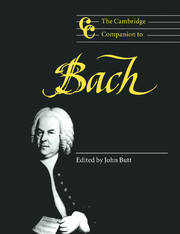Introduction
Published online by Cambridge University Press: 28 September 2011
Summary
The context and aims of the project
Twenty years ago it would have been relatively easy to predict the contents of a Cambridge companion to Bach: a basic introduction to the composer's life and works, fundamental information to enhance analysis and appreciation, perhaps also a summary of recent research and performance. While the present volume hardly represents a radical departure from this brief, the situation is now considerably more complex than it was in the 1970s. First, with the publication of the New Grove dictionary of music and musicians and several important monographs on the life and works of J. S. Bach, there is already a sizeable and reliable literature for readers of every level. Secondly, there is the mushrooming of published material throughout all fields of music scholarship: now it is virtually impossible to do justice to every slant, every area of study, even to every field of Bach's compositional output. Finally, there are the interesting issues concerning musicology that have come to the fore during the last decade or so: what actually is music scholarship? what are its aims? how much should we be catering for ‘music appreciation’? what is the significance today of a ‘great’ composer?
Bach studies have, in fact, set the tone for much music scholarship during the last thirty years. With the spectacular revisions to the chronology of Bach's cantatas in the late 1950s by Alfred Dürr and Georg von Dadelsen, overthrowing many fundamental assumptions about Bach's creative life and ever-increasing piety, the next two decades were dominated by a style of research that valued certifiable fact above critical judgement or informed opinion. Much has changed during the last decade or so: 'positivism' - as the activity of fact-gathering has, somewhat grandly, been named - has often been branded the occupation only of the dull and bibliographically-minded, while 'criticism' and - most importantly- interdisciplinary work are, to some, the direction for the elect.
- Type
- Chapter
- Information
- The Cambridge Companion to Bach , pp. 1 - 6Publisher: Cambridge University PressPrint publication year: 1997
- 12
- Cited by

